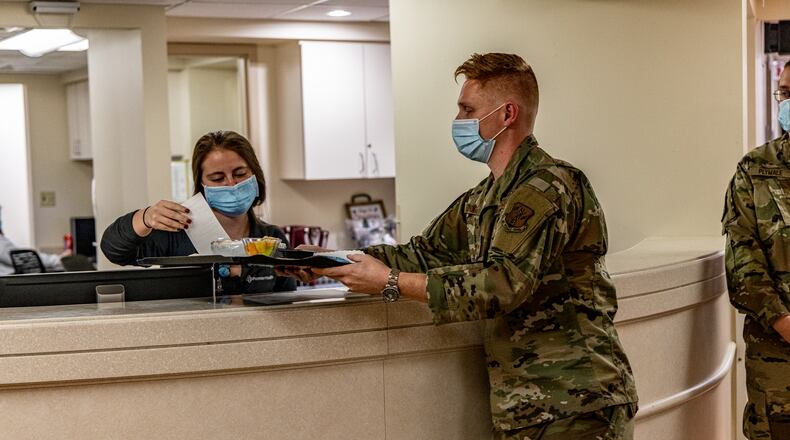The memo says local health departments should shift to a cluster- or outbreak-based model, and prioritize people in high-risk residential settings like nursing homes and prisons, or clusters of cases related to new variants.
Vanderhoff said local schools also can discontinue universal contact tracing. But he said they should continue to follow the policy of “Mask to Stay, Test to Play.”
“Mask to Stay” allows students exposed to COVID-19 to stay in school if they wear a mask and remain asymptomatic. “Test to Play” says student-athletes who have been exposed to COVID should be tested twice and can keep playing if they test negative, stay asymptomatic and wear a mask “when able.”
“The best place for kids is in school, in-person, full-time,” Vanderhoff said.
School districts also will begin reporting COVID-19 cases on a weekly basis rather than a daily basis beginning Feb. 4, the memo says. Local health departments will continue to report school data on a weekly basis.
Michelle Fong, an ODH spokeswoman, said the updated guidance would not necessarily change how a parent gets notifications about COVID-19 from their child’s school.
“Schools are still encouraged to make notifications to parents about exposure to positive cases that they become aware of (via voluntary parent reporting or test-to-play positive results) by classroom and school building,” Fong said. “These general exposure notifications will provide families with useful information to guide their level of precaution.”
Huber Heights Schools already stopped notifying parents of positive cases within a student’s building, but will notify parents if a positive case occurs in a student’s classroom or school activity.
District spokeswoman Cassie Dietrich said the updated guidance may affect how the district communicates positive cases to parents, but any change would not occur until after the next school board meeting on Feb. 10, as the school board approves the district’s COVID-19 plans.
Sarah Swan, a spokeswoman for Centerville Schools, said the latest guidance changes little for the district.
“Each of our buildings will continue to send building-wide notifications of positive cases, and the total case numbers for the district and each school building will still be updated on the district website on Friday afternoons,” she said.
ODH has had repeated problems with the accuracy of school COVID reporting, and Vanderhoff’s memo says ODH “will continue to evaluate related school reporting requirements.”
ODH emphasized proper steps for those infected with COVID-19, and asked health departments and schools to remind the public about disease prevention strategies:
- ODH encouraged Ohioans to stay up to date with COVID-19 vaccinations, including booster doses, calling them “the best prevention tool we have against severe illness and death.”
- ODH reinforced the importance of mask wearing, physical distancing, improving ventilation, hand washing, cough etiquette, testing, and staying home if you are sick.
Dan Suffoletto, a spokesman for Public Health – Dayton & Montgomery County, said the changes will help health departments.
“The ODH statement acknowledges the reality that local health departments were already facing,” he said. “The large number of cases has made it a challenge for all health departments to contact every individual who has tested positive.”
About the Author

